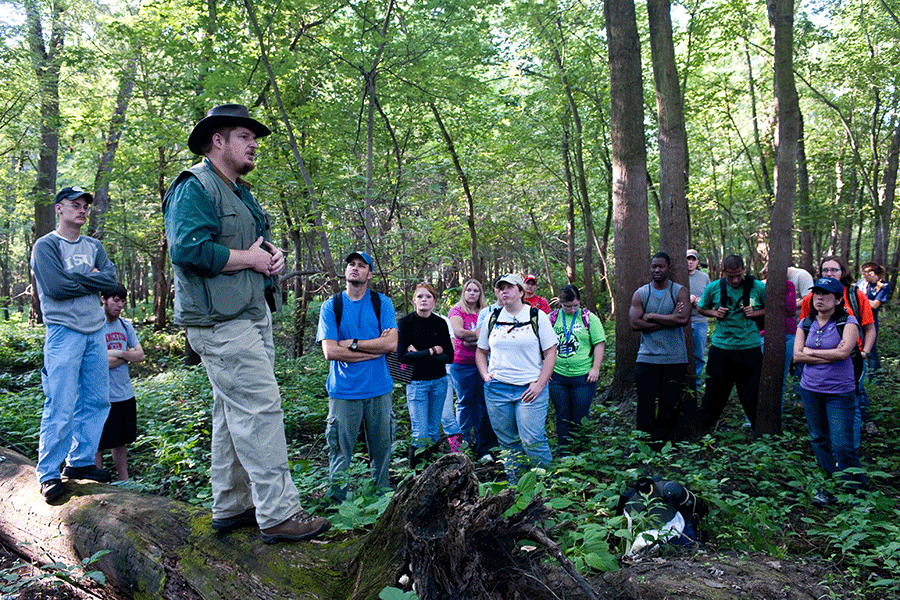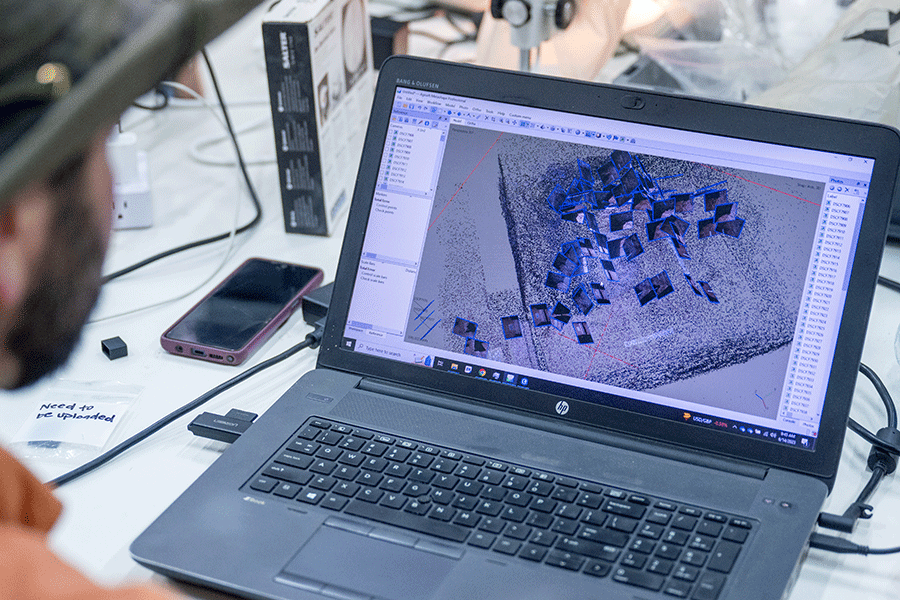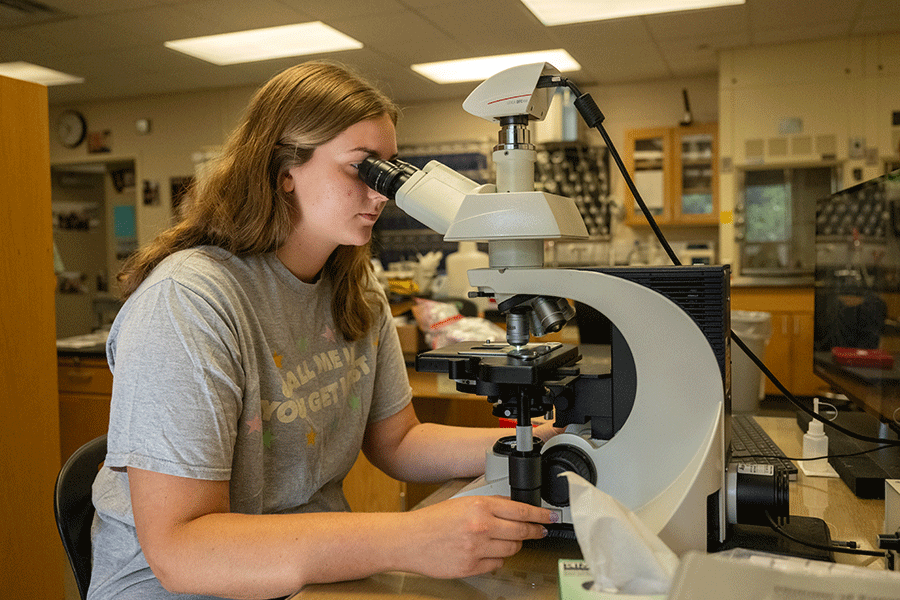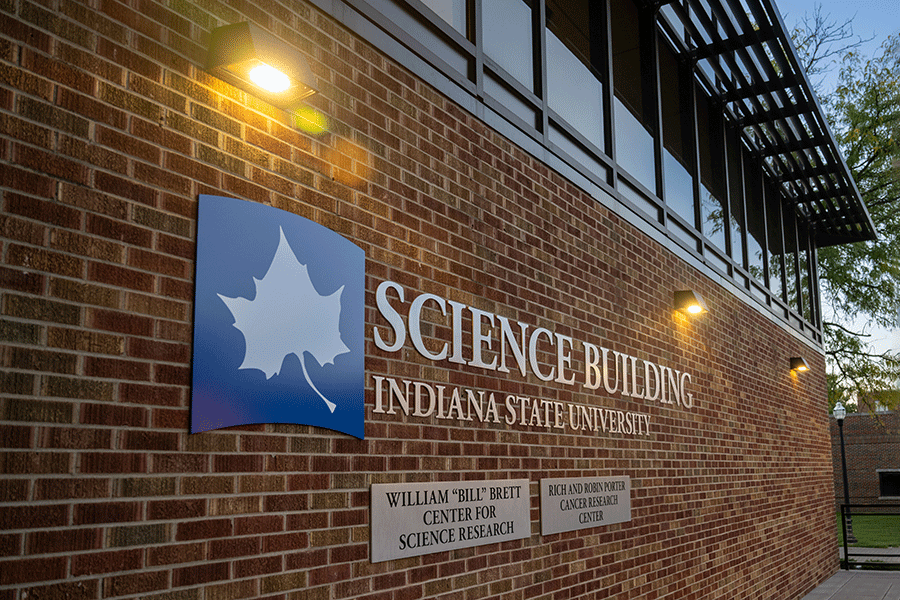Program Availability
The Spatial and Earth Sciences PhD is a traditional, on-campus program offered on the Indiana State University campus in Terre Haute, Indiana. The program is open to U.S. and international applicants who satisfy admission requirements.
Why Choose the Spatial and Earth Sciences PhD Program at Indiana State?
Indiana State’s Spatial and Earth Sciences PhD is a highly specialized and research-intensive program that will enable you to contribute to the understanding of our planet's physical processes and spatial characteristics while preparing you for career opportunities in academia and various sectors of the workforce.
Advance Knowledge and Build Expertise
The Doctor of Philosophy (PhD) in Spatial and Earth Sciences emphasizes innovative, interdisciplinary applied research that enables you to develop professional expertise in your discipline
As a graduate student in the program, you will have the option of completing a concentration in geography or earth science, depending on your research interests and career goals. You will choose from a range of research topics, including remote sensing, geographic information science, dendrochronology, environmental sciences, geoarchaeology, biogeochemistry, paleoecology, paleoclimatology, and paleoceanography.
Faculty members will work closely with you throughout the program.
Learn from Our Excellent Faculty
The Department of Earth and Environmental Systems is staffed with full-time tenured/tenure-track graduate faculty with teaching and research experience covering a range of environmental and geoscience topics.
Areas of specialization include but are not limited to: environmental geology, biogeochemistry, oceanography, environmental justice, remote sensing, GIS, dendrochronology, quaternary paleoecology, and paleoclimatology.
Research Facilities and Funding
Research funding comes primarily from federal and Indiana state agencies and private industry. Teaching assistantships are available. The department has well-equipped research facilities, and faculty members and graduate students work with scientists from other departments at the University and with colleagues from other universities and government agencies.
Research facilities include laboratories for: remote sensing/GIS; climatology, urban environment and sustainability; environmental geology; biogeochemistry; geomorphology; biogeography; spatial analysis; paleoceanography; marine science; micropaleontology; sedimentary petrology; dendrochronology; geoarchaeology; archaeology, and bioanthropology.
What You’ll Learn in the Spatial and Earth Sciences Program
In addition to the required core coursework, you will complete a concentration in geography or earth science, departmental electives, cognate courses offered outside the department, and a dissertation.
Your dissertation committee will work closely with you throughout the program and help you determine which courses to take to achieve your academic and research goals.
Assistantships and Scholarships
Many graduate students receive some form of financial assistance, including scholarships, fellowships, and federal financial aid. In addition, graduate assistantships (GAs) enable students to work on campus for up to 20 hours a week and include a stipend and partial tuition waiver. GAs are highly competitive.
Admission Requirements and Instructions
To be assured of consideration for admission, all application materials must be submitted by January 15 (for Fall entry) or November 1 (for Spring entry). To ensure consideration for funding, applications must be submitted by the Fall deadline, as funding is typically determined by the Fall deadline each academic year. Conditional admission for missing documents is not granted.
For details, visit Admission Requirements and Application Instructions.
Career Possibilities for Spatial and Earth Sciences Graduates
Our PhD graduates pursue various career paths, including academia, research positions in government agencies or private industry, environmental consulting, data analysis, policy development, and more. Specific career opportunities depend on the research focus and interests.
According to the Bureau of Labor Statistics, overall employment of postsecondary teachers is projected to grow 8% from 2022 to 2032, faster than the average for all occupations. The median annual wage was $80,840 in May 2022.
Employment of geoscientists is projected to grow 5%, faster than the average for all occupations. The median annual wage was $87,480 in May 2022. Employment of environmental scientists and specialists is projected to grow 6%, with a median annual wage of $76,480 in May 2022.
Employment of geographers is projected to remain steady. The median annual wage was $88,900 in May 2022.
Admission Requirements
To be assured of consideration for admission, all application materials must be submitted by January 15 (for Fall entry) or November 1 (for Spring entry). To ensure consideration for funding, applications must be submitted by the Fall deadline, as funding is typically determined by the Fall deadline each academic year. Conditional admission for missing documents is not granted.
Requirements for Admission
Minimum requirements for admission consideration include the following:
You should possess a baccalaureate degree granted by a regionally accredited institution (for international students, a degree granted by a recognized institution).
You must have a minimum cumulative grade point average (GPA) of 2.7 in all undergraduate coursework; or a minimum cumulative GPA of 3.0 in the last 60 credits of undergraduate coursework; or a minimum cumulative GPA in the applicant’s major field of study; or a minimum GPA of 3.0 in all courses taken at the graduate level.
Official GRE scores are required. To be official, scores must be sent directly from the Educational Testing Service (ETS) to Indiana State University.
Three letters of recommendation from individuals familiar with your academic, research, and/or fieldwork record are required. Important: Have the names and email addresses of references available at the time that you are completing your admission application, as you will need to enter them in the online application. Explain to your references that they will receive an email from Indiana State University requesting that they submit a letter of recommendation. Please ensure that your references expect to receive this request. It will be sent to your references immediately upon completing the application.
Please include a personal statement/letter of intent that describes in detail your research interests and academic career goals and indicates the faculty member(s) you would like to work with. Please indicate in the letter if you would like to be considered for Graduate Assistantship funding and a tuition fee waiver in your statement.
Please submit a current curriculum vitae as part of your application.
International applicants must submit official scores for the Test of English as a Foreign Language (TOEFL) or provide equivalent evidence of language proficiency.
To be assured of consideration for admission, all application materials must be submitted by January 15 (for Fall entry) or November 1 (for Spring entry). To ensure consideration for funding, applications must be submitted by the Fall deadline, as funding is typically determined by the Fall deadline each academic year. Conditional admission for missing documents is not granted.
Application Instructions
Listed below are application instructions and deadlines for the Spatial and Earth Sciences PhD.
Complete and submit your online application to Indiana State University.
Please add the following text on a next line. The name of the college will need to be supplied for each program.
After selecting that you are applying for Graduate or International>Graduate admissions, you must select the college for your program. This program is in the College of Arts and Sciences.
Submit official transcripts from all colleges previously attended. To be official, transcripts must be sent directly from the college attended to: Graduate Admissions, Indiana State University, Welcome Center, 318 North Sixth Street, Terre Haute, IN, 47809. E-transcripts should be sent to admissions@indstate.edu.
Submit a nonrefundable application fee of $45.00 (U.S. citizens and permanent residents) or $65.00 (international students) payable by Visa, MasterCard, or check or money order payable to Indiana State University. Submit payment to: Indiana State University, Graduate Admissions, Welcome Center, 318 North Sixth Street, Terre Haute, IN, 47809.
Submit official GRE scores. To be official, scores must be sent directly from the Educational Testing Service (ETS) to Indiana State University.
Submit the following as part of the online application process.
- Names and email addresses of three references who will write letters of reference
- A personal statement/letter of intent
- A current curriculum vitae
- Any supplemental documents
International applicants must submit official scores for the Test of English as a Foreign Language (TOEFL) or provide equivalent evidence of language proficiency. Submit scores to: Indiana State University, Graduate Admissions, Welcome Center, 318 North Sixth Street, Terre Haute, IN, 47809.
For other important information about applying as an international student, see our International Graduate Admission page.
Deadlines and Next Steps
To be assured of consideration for admission, all application materials must be submitted by January 15 (for Fall entry) or November 1 (for Spring entry). To ensure consideration for funding, applications must be submitted by the Fall deadline, as funding is typically determined by the Fall deadline each academic year. Conditional admission for missing documents is not granted.
Once admitted, students receive notification from the University as well as their University ID number needed to activate their University Username on the MyISU Portal. The Portal offers access to online registration, University records, and other important University services, including email and University announcements.
Note: Returning ISU students must apply for re-admission if they have not attended Indiana State University for more than two calendar years.
-

Geology (BS)
Bachelor's




